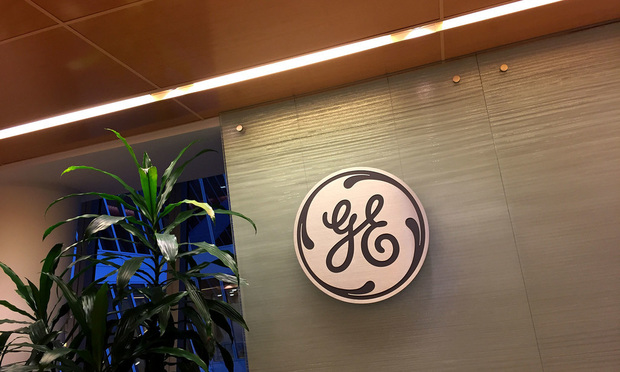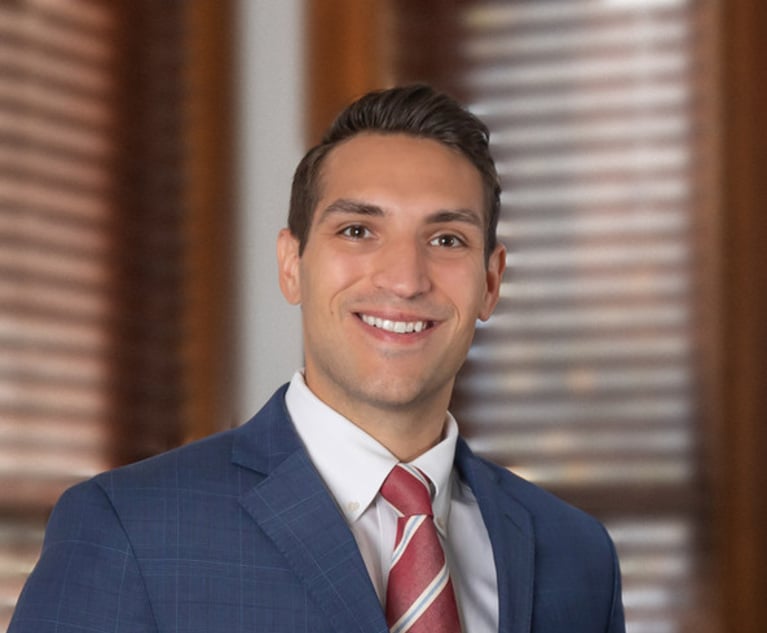Labaton Sucharow Takes on General Electric in Class Action Over Anesthesia Machines
GE is facing a class action alleging it squelches competition to hurt independent companies that maintain its gas anesthesia machines.
March 22, 2019 at 01:37 PM
4 minute read
 GE Office Sign, Washington, D.C. Photo: Diego M. Radzinschi/ALM
GE Office Sign, Washington, D.C. Photo: Diego M. Radzinschi/ALM
Lawyers from antitrust litigation firm Labaton Sucharow have filed a prospective class action against General Electric and two of its health care subsidiaries, alleging the Boston-based company is trying to freeze out independent firms that service the GE gas anesthesia machines.
Gregory Asciolla, one of the three lead attorneys from the New York City-based law firm, is co-chairman of Labaton Sucharow's antitrust and competition litigation practice. In that role, Asciolla focuses on representing businesses and public pension funds in complex antitrust and commodities class actions. He also represents clients in global antitrust matters involving price-fixing, benchmark and commodities manipulation, pay-for-delay and other anti-competitive practices.
Now Asciolla has joined with Labaton's Jay Himes and Karin Garvey in taking on GE on behalf of customers, such as clinics, hospitals and doctor groups, that use its machines. Also representing the plaintiff are Daniel Sonneborn and Eric Penley of Preti Flaherty Beliveau & Pachios; Charles Barrett and Benjamin Aaron of Neal & Harwell; and Robert King of The King Law Firm.
The named plaintiff in the lawsuit, filed March 14 in federal court in Boston, is the Monroe County Health Care Authority in Alabama.
“We are suing GE for engaging in exclusionary practices for servicing their anesthesia machines and for their monopolization of the market,” Asciolla said Friday. “Independent ISOs [independent service organizations] who provide services to those machines in competition with GE are being closed out of the market, which is allowing GE to charge super competitive prices. The purpose of this suit is to stop the exclusionary conduct to allow ISOs to get into the market and to have healthy competition for the purchases of services.”
Asciolla pointed to a 2017 federal jury finding that GE had monopolized the market and charged inflated prices as one reason the prospective class action filed last week could be settled sooner rather than later. ISOs brought the lawsuit, in which the jury found in their favor two years ago. The most recent lawsuit was filed on behalf of the customers, such as hospitals.
“Antitrust cases tend to take a long time to resolve, anywhere from four to 10 years,” Asciolla said. “This one might be quicker, though, based on the fact that there was a jury verdict against GE already. It might speed things along.”
In the 2017 case, GE failed in its motion to have the court set aside the jury's monopoly findings.
The latest lawsuit is replete with alleged examples of how GE monopolized its product, including a claim GE denied its ISOs training courses beginning in 2014.
“Furthermore, GE has demanded that ISOs seeking to enroll in training courses must undergo a burdensome process that requires them to disclose competitively sensitive information,” the lawsuit reads. “As a result, ISOs have been effectively denied the necessary training for servicing GE gas anesthesia machines.”
The lawsuit seeks class certification, unspecified monetary damages and to have GE permanently enjoined from continuing its alleged exclusionary conduct.
Representing GE is Al Pfeiffer of Latham & Watkins. Pfeiffer did not respond to a request for comment.
A GE representative emailed a statement Friday suggesting no wrongdoing on its part.
“We are proud to deliver life-saving technologies and services to our customers,” the company said. “While we don't comment on pending litigation, we believe our actions have been appropriate.”
The case will be heard in front of Judge Richard Stearns.
This content has been archived. It is available through our partners, LexisNexis® and Bloomberg Law.
To view this content, please continue to their sites.
Not a Lexis Subscriber?
Subscribe Now
Not a Bloomberg Law Subscriber?
Subscribe Now
NOT FOR REPRINT
© 2025 ALM Global, LLC, All Rights Reserved. Request academic re-use from www.copyright.com. All other uses, submit a request to [email protected]. For more information visit Asset & Logo Licensing.
You Might Like
View All
Apple Disputes 'Efforts to Manufacture' Imaging Sensor Claims Against iPhone 15 Technology

Patent Disputes Over SharkNinja, Dyson Products Nearing Resolution

Judge Slashes $2M in Punitive Damages in Sober-Living Harassment Case
Trending Stories
- 1Many LA County Law Firms Remain Open, Mobilize to Support Affected Employees Amid Historic Firestorm
- 2Stevens & Lee Names New Delaware Shareholder
- 3U.S. Supreme Court Denies Trump Effort to Halt Sentencing
- 4From CLO to President: Kevin Boon Takes the Helm at Mysten Labs
- 5How Law Schools Fared on California's July 2024 Bar Exam
Who Got The Work
Michael G. Bongiorno, Andrew Scott Dulberg and Elizabeth E. Driscoll from Wilmer Cutler Pickering Hale and Dorr have stepped in to represent Symbotic Inc., an A.I.-enabled technology platform that focuses on increasing supply chain efficiency, and other defendants in a pending shareholder derivative lawsuit. The case, filed Oct. 2 in Massachusetts District Court by the Brown Law Firm on behalf of Stephen Austen, accuses certain officers and directors of misleading investors in regard to Symbotic's potential for margin growth by failing to disclose that the company was not equipped to timely deploy its systems or manage expenses through project delays. The case, assigned to U.S. District Judge Nathaniel M. Gorton, is 1:24-cv-12522, Austen v. Cohen et al.
Who Got The Work
Edmund Polubinski and Marie Killmond of Davis Polk & Wardwell have entered appearances for data platform software development company MongoDB and other defendants in a pending shareholder derivative lawsuit. The action, filed Oct. 7 in New York Southern District Court by the Brown Law Firm, accuses the company's directors and/or officers of falsely expressing confidence in the company’s restructuring of its sales incentive plan and downplaying the severity of decreases in its upfront commitments. The case is 1:24-cv-07594, Roy v. Ittycheria et al.
Who Got The Work
Amy O. Bruchs and Kurt F. Ellison of Michael Best & Friedrich have entered appearances for Epic Systems Corp. in a pending employment discrimination lawsuit. The suit was filed Sept. 7 in Wisconsin Western District Court by Levine Eisberner LLC and Siri & Glimstad on behalf of a project manager who claims that he was wrongfully terminated after applying for a religious exemption to the defendant's COVID-19 vaccine mandate. The case, assigned to U.S. Magistrate Judge Anita Marie Boor, is 3:24-cv-00630, Secker, Nathan v. Epic Systems Corporation.
Who Got The Work
David X. Sullivan, Thomas J. Finn and Gregory A. Hall from McCarter & English have entered appearances for Sunrun Installation Services in a pending civil rights lawsuit. The complaint was filed Sept. 4 in Connecticut District Court by attorney Robert M. Berke on behalf of former employee George Edward Steins, who was arrested and charged with employing an unregistered home improvement salesperson. The complaint alleges that had Sunrun informed the Connecticut Department of Consumer Protection that the plaintiff's employment had ended in 2017 and that he no longer held Sunrun's home improvement contractor license, he would not have been hit with charges, which were dismissed in May 2024. The case, assigned to U.S. District Judge Jeffrey A. Meyer, is 3:24-cv-01423, Steins v. Sunrun, Inc. et al.
Who Got The Work
Greenberg Traurig shareholder Joshua L. Raskin has entered an appearance for boohoo.com UK Ltd. in a pending patent infringement lawsuit. The suit, filed Sept. 3 in Texas Eastern District Court by Rozier Hardt McDonough on behalf of Alto Dynamics, asserts five patents related to an online shopping platform. The case, assigned to U.S. District Judge Rodney Gilstrap, is 2:24-cv-00719, Alto Dynamics, LLC v. boohoo.com UK Limited.
Featured Firms
Law Offices of Gary Martin Hays & Associates, P.C.
(470) 294-1674
Law Offices of Mark E. Salomone
(857) 444-6468
Smith & Hassler
(713) 739-1250











